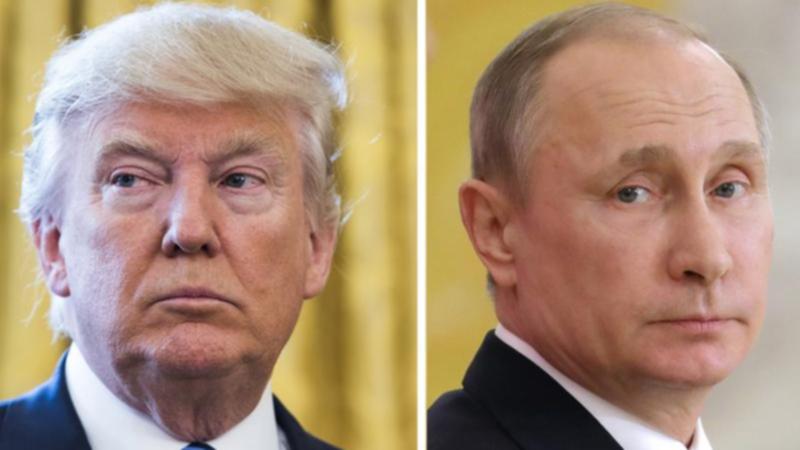US-Russia peace talks on Ukraine: Moscow makes NATO demand as European leaders, Zelensky locked out
As the United States and Russia’s day one peace talks are labelled ‘not successful’, Moscow has made a fresh demand of NATO, as Ukraine and European allies watched anxiously from the sidelines.

US and Russian officials in Riyadh have wrapped up their first talks on ending the war in Ukraine, as Moscow raised a new demand that NATO formally disavow a membership promise it made to Kyiv in 2008.
Ukraine and its European allies watched anxiously from the sidelines as American and Russian officials spoke for more than four hours in the Saudi capital.
The talks underscored the rapid pace of US efforts to halt the conflict, less than a month after President Donald Trump took office and six days after he spoke by phone to Russian President Vladimir Putin.
Sign up to The Nightly's newsletters.
Get the first look at the digital newspaper, curated daily stories and breaking headlines delivered to your inbox.
By continuing you agree to our Terms and Privacy Policy.Senior US officials said on Tuesday that all sides will need to make concessions in order to bring about an end to the three-year-old Ukraine war.
“Today is the first step of a long and difficult journey but an important one,” Secretary of State Marco Rubio said.
White House national security adviser Mike Waltz, also part of the US delegation alongside special envoy Steve Witkoff, told reporters that no date had been set for a summit between US President Donald Trump and Russian President Vladimir Putin.
The US delegation said negotiations would include discussions about territory and security guarantees for Ukraine.
Russia controls about a fifth of Ukraine.
Foreign Minister Sergei Lavrov said: “Today’s talks were not unsuccessful”.
Russia and the US agreed to establish a process for settling the Ukraine conflict and to remove barriers for diplomatic missions, Mr Lavrov said.
Amid concerns in Ukraine and among European allies about the US-led effort, Mr Rubio said the goal is an agreement that is “acceptable to everyone involved in it, and that obviously includes Ukraine, but also our partners in Europe, and, of course, the Russian side as well”.
Ukraine and European leaders are worried that Trump could cut a hasty deal with Moscow that ignores their security interests, rewards Russia for invading its neighbour and leaves Putin free to threaten Ukraine or other countries in the future.
Critics say that Mr Trump’s team, by ruling out NATO membership for Ukraine and saying that Kyiv’s desire to win back all its lost territory is an illusion, has made major concessions in advance.
US officials say they are simply recognising reality.
Ukraine says no peace deal can be made on its behalf.
“We, as a sovereign country, simply will not be able to accept any agreements without us,” President Volodymyr Zelensky said last week.
Mr Zelensky postponed his visit to Saudi Arabia in order to not give “legitimacy” to Tuesday’s meeting between US and Russian officials in Riyadh, two sources familiar with the matter told Reuters.
Hours after the start of the Riyadh meeting, Russian Foreign Ministry spokeswoman Maria Zakharova told reporters in Moscow it was “not enough” for NATO not to admit Ukraine as a member.
She said the alliance must go further by disavowing a promise it made at a summit in Bucharest in 2008 that Kyiv would join at a future, unspecified, date.
The meeting in the Saudi capital of Riyadh also highlights de facto leader Crown Prince Mohammed bin Salman’s efforts to be a major diplomatic player, burnishing a reputation severely tarnished by the 2018 killing of Washington Post journalist Jamal Khashoggi.
In Riyadh, three US officials in the first month of their jobs - Secretary of State Marco Rubio, national security adviser Mike Waltz and Mr Trump’s Middle East envoy Steve Witkoff - were lined up opposite two veterans of Russian diplomacy.
Mr Lavrov has been in his role since 2004, and Kremlin aide Yuri Ushakov has served as Mr Putin’s foreign policy adviser since 2012.
European leaders held emergency talks on Monday calling for higher spending to ramp up the continent’s defence capabilities but remained split on the idea of deploying peacekeepers to Ukraine.
France plans to host a second meeting to discuss Ukraine and European security on Wednesday, but has this time invited European countries who were not present earlier this week and NATO ally Canada, diplomatic sources said on Tuesday.
Two diplomatic sources said the countries invited were Norway, Canada, the three Baltic states (Lithuania, Estonia and Latvia), the Czech Republic, Greece, Finland, Romania, Sweden and Belgium.
On Monday, British Prime Minister Keir Starmer, said he was willing to send peacekeeping troops but there must be a US security “backstop” for European countries to put boots on the ground.
During the Riyadh talks, Mr Lavrov told the US that the deployment of NATO troops in Ukraine, even under other flags, was not acceptable to Russia.
Meanwhile, Russia continued to pummel Ukraine with drones, according to Kyiv’s military.
The Ukrainian Air Force said Russian troops launched a barrage of 176 drones at Ukraine overnight, most of which were destroyed or disabled by jamming.
with AP
